November 2011
 The end-of-the-year holiday season is a time to reflect. Either quarterly budgets and goals were met or January’s great expectations have given way to the financial reality of a bad year. For most, it’s a time to relax and enjoy the company of friends and family while feasting at office parties and family gatherings.
The end-of-the-year holiday season is a time to reflect. Either quarterly budgets and goals were met or January’s great expectations have given way to the financial reality of a bad year. For most, it’s a time to relax and enjoy the company of friends and family while feasting at office parties and family gatherings.
For caterers in Lawrence, the holiday season is one of the busiest, and most profitable, times of the year. Three local companies describe how they handle the stress, expense and joys of helping others celebrate.
Evan Williams, owner of Evan Williams Catering, loves the holiday season. “It reminds me of why I got into the business,” Williams says. “I grew up in an entertaining house. My mother was always cooking for guests and hosting parties. A lot of them were for my dad and his football friends, but the holiday 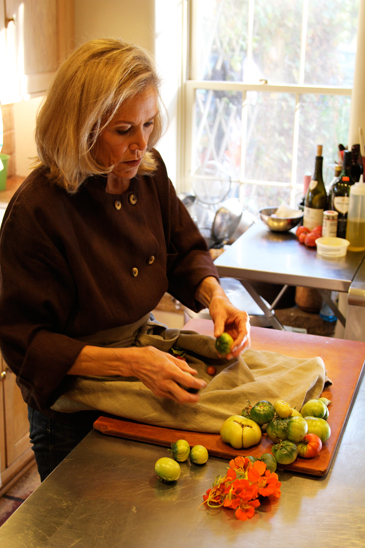 season was a very busy time in my mother’s kitchen. So cooking for other’s celebration is a real pleasure for me.”
season was a very busy time in my mother’s kitchen. So cooking for other’s celebration is a real pleasure for me.”
Williams has been fine-tuning her cooking and business practice for more than 20 years. Her dedication to the craft cannot be questioned. In fact, she finished her first paying job the day she was due to give birth to her first child.
“I was catering a luncheon at a bank and kept having these pains,” Williams recalls. “I called my doctor, who wasn’t too pleased with me. He subtly reminded me I was due and let me know I was having contractions.”
Williams finished serving the meal, politely thanked the bank president and headed to the hospital. “My son was born 45 minutes later,” she says. “Maybe I should have bowed out sooner, but that was my first gig, I had to get it right.”
That type of resolve to make each dish, and every event, fantastic is both a challenge and a goal for any good caterer, Williams says. People trust you to make their party or event a success, and disappointing a client can have disastrous consequences. When you work as a caterer, you’re not cooking for one or two people; you’re cooking for a roomful of people. Since dishes are planned and prepped well before the event, if you get it wrong, it is incredibly difficult to make changes.
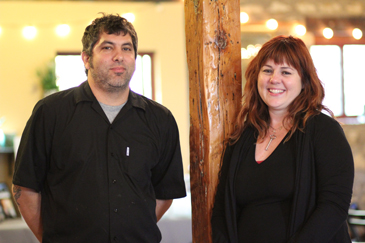 “Luckily, we haven’t had that happen,” says Regan Pillar, who owns Culinaria with her husband Aaron. “We’ve been at it for more than 2 years, and I hope we never have a horror story to tell. We make it a priority to communicate as clearly as possible with clients about what they want and what we can provide. Managing expectations is a top priority. We have as many conversations about the event as possible to help ensure we get it right the first time, because there isn’t a second time.”
“Luckily, we haven’t had that happen,” says Regan Pillar, who owns Culinaria with her husband Aaron. “We’ve been at it for more than 2 years, and I hope we never have a horror story to tell. We make it a priority to communicate as clearly as possible with clients about what they want and what we can provide. Managing expectations is a top priority. We have as many conversations about the event as possible to help ensure we get it right the first time, because there isn’t a second time.”
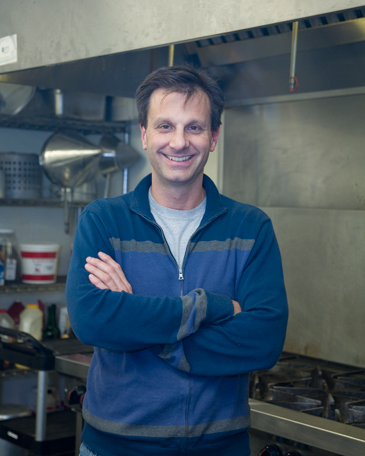 Stephen Maceli, owner of Maceli’s in downtown Lawrence, agrees. “Many people don’t understand that most restaurant food doesn’t always translate into catering,” Maceli says. “The reality of catering is that most food is prepped and cooked at one location, then transported and served at another. Food must be resilient to this delay in serving without sacrificing taste, texture and temperature.”
Stephen Maceli, owner of Maceli’s in downtown Lawrence, agrees. “Many people don’t understand that most restaurant food doesn’t always translate into catering,” Maceli says. “The reality of catering is that most food is prepped and cooked at one location, then transported and served at another. Food must be resilient to this delay in serving without sacrificing taste, texture and temperature.”
Williams says working on other people’s ideas can be difficult. “I know what I like and I know how to make it,” she says. “I think most caterers are like that. We didn’t get into the businesses because we wanted to cook other people’s recipes. One of the biggest challenges for me is letting go of some of the creative control. I’m lucky enough to be in the position now where people know me for my food, so I have to conform less. But reminding yourself you are working for your client is important.”
Most holiday parties are smaller affairs than, say, a wedding reception. Aaron Pillar says that is both a blessing and a curse.
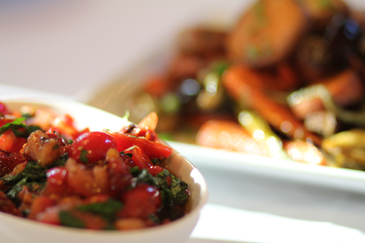 “At a wedding you have fairly solid head count,” Pillar says. “Often you are serving by the plate and you have budgeted your food and service for that certain number of plates. Smaller, holiday events tend to be buffet style and hosts are often uncertain of the headcount. Pricing for the food is a fine line, because if you charge too much and have a bunch of leftovers, your client won’t be happy. Of course, that’s much better than not ordering or preparing enough food.”
“At a wedding you have fairly solid head count,” Pillar says. “Often you are serving by the plate and you have budgeted your food and service for that certain number of plates. Smaller, holiday events tend to be buffet style and hosts are often uncertain of the headcount. Pricing for the food is a fine line, because if you charge too much and have a bunch of leftovers, your client won’t be happy. Of course, that’s much better than not ordering or preparing enough food.”
Maceli says having a definite policy on food orders helps in two ways, he doesn’t have to worry about leftovers and the client knows exactly what they are getting.
The policy, he says, helps maintain the bottom line. “When you order food from us, you get to keep the leftovers,” Maceli says. “We will even pack them up for you as long as you request them in a timely manner. My philosophy is we make what is ordered and you get to keep what you ordered. People always ask if we plan for extras. We let them know that if they think that more guests will show up, order more, and if they don’t they get to keep the food, so nothing is wasted.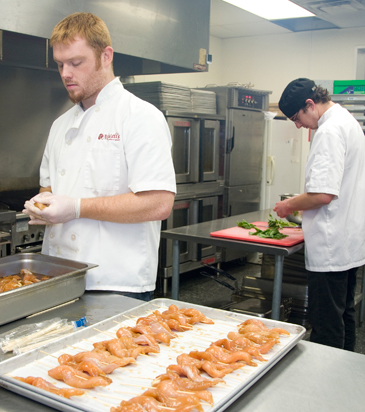
Since the price of food changes so frequently and unpredictably, budgeting for an event is difficult.
“You have to figure in some wiggle room on pricing,” Williams says. “The price of an ingredient may increase 5 or 10 percent between the time you price it and the time you purchase it. If you already priced it too low, you have to eat that cost.”
Aaron and Regan at Culinaria factor unstable food prices into quotes. “We always estimate high when calculating the cost of food,” Regan says. “Especially as a young company, we cannot lose money on a job. We work very hard to make our margins on food as solid as we can.”
Food, though the center of a caterer’s business, is often not the biggest expense.”Labor is the greatest expense in our type of catering,” Maceli says. “One big difference between Maceli’s and other companies is service fees or gratuities. At Maceli’s, there is no 18-20% service fee that is added on to one’s bill. All food and beverages include some type of service.”
The Pillars say they spend less on labor and more on hardware. “There is always another pot to buy or warmer to get,” Regan says. “Every event we cater is different, and almost all need a unique piece of equipment. The profit from the first job we ever catered was spent entirely on equipment. Now we budget a percentage of every job toward equipment costs.”
Making a living working at other’s parties gives caterers a keen sense of what makes a party work. Maceli says planning ahead and making it interesting is the key to hosting a great holiday party.
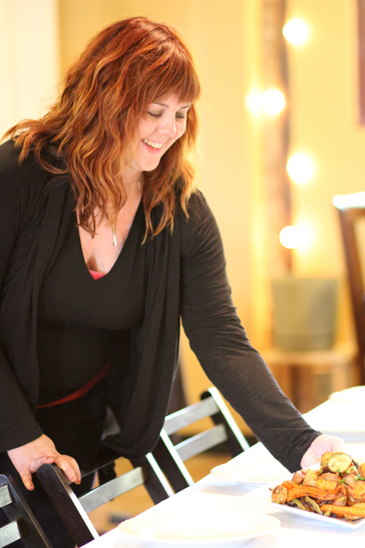 “Holiday entertaining is more special when there is great food and plenty of it,” Maceli says. “I recommend having one or two items that people can talk about. When entertaining at home, try to choose items that can be prepped ahead of time and reheated easily. Your menu should also reflect the production capacity of your kitchen. If your kitchen is small, potlucks can be great. Since guests would likely bring something they are proud of, potlucks can make for superior buffets, unless everyone brings chips.”
“Holiday entertaining is more special when there is great food and plenty of it,” Maceli says. “I recommend having one or two items that people can talk about. When entertaining at home, try to choose items that can be prepped ahead of time and reheated easily. Your menu should also reflect the production capacity of your kitchen. If your kitchen is small, potlucks can be great. Since guests would likely bring something they are proud of, potlucks can make for superior buffets, unless everyone brings chips.”
Aaron Pillar tells clients to think a little differently. “Try to make it something people actually want to do, ” he says. “We’ve all been to the party in the conference room and had a tray of cold cuts with punch. Boring. Have us make a signature cocktail, host the party at someone’s home and get some great food. And be sure to have booze. It makes interesting people more interesting and boring people more tolerable.”
Interesting people help, says Williams, but food can save almost any party.
“Good food can be the savior of almost any party,” she says. “Let’s face it, well-planned, great tasting food is one of the great pleasure of life. The holidays are a great time to indulge.”

5 Comments
Medications online Australia: online pharmacy australia – Medications online Australia
buy antibiotics over the counter BiotPharm cheapest antibiotics
Ero Pharm Fast: cheapest ed medication – cheap ed
ed pills: ed pills for sale – Ero Pharm Fast
PharmAu24: Pharm Au24 – PharmAu24